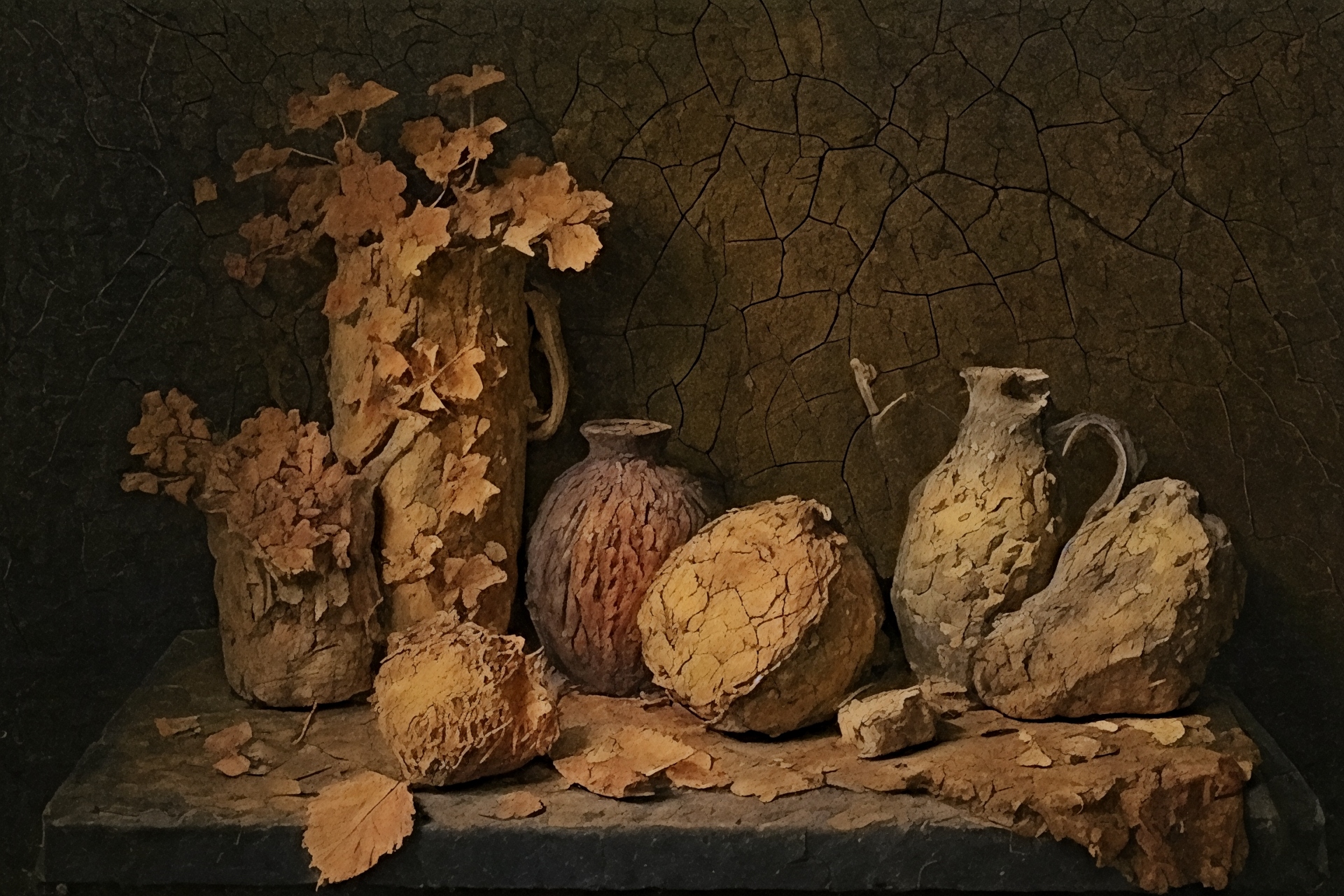Introducing 100 Scientific Visions Research Project

An Augmented Science Odyssey
For years, my notebooks, markdown lists, experiment folders, datasheets, mindmaps, and archives have sagged under the weight of accumulated more or less serious ideas: sketches of scientific conjectures (often quite wandering), hypotheses, fragments of engineering concepts, speculative art theories, science, technology, and the curious spaces where they intersect. Sometimes, open questions I felt bound to answer… someday. Ideas scribbled down in moments of clarity (or perhaps caffeine-fueled hubris) that seemed, and still seem, worthy of more than benign neglect.
The question for anyone cursed (or blessed) with such hyperactive or relentless curiosity is: what do you do with it all? Letting potentially fruitful notions wither on the vine feels like a peculiar kind of intellectual malpractice.
“Wherefore the haste to divulge my Method? Let it mature privately—I see no perturbation arising from prudent delay.” – Isaac Newton, circa 1675
So, I’m doing something about it.
I’m thrilled to introduce 100 Scientific Visions, a research project born from those very notebooks to challenge critical thinking. But this isn’t just about dusting off old ideas. It’s an experiment in how we bring ideas to fruition in this century. The core ambition is straightforward, if slightly audacious: to develop and publish 100 distinct scientific papers or theses, each rooted in one of mine original concepts.
The Twist: A Meta Approach
“So, this ‘Large Language Model’ allows a thesis to exist simultaneously in states of ‘potentially brilliant’ and ‘utterly flawed’? Does one need a counter to ascertain if the underlying concept is alive or dead before opening the box?” – Erwin Schrödinger, contemplating
Here’s where it gets interesting (and potentially fraught with fascinating peril). This project will consciously and strategically leverage the power of Large Language Models (LLMs) and other AI tools in various phases of work, applying its strengths even on the process itself. The struggle of finding the right balance and the effects of methodology on the whole research journey — and researcher — can be particularly valid and valuable. This is not about asking an AI to dream up science autonomously or churn out papers like some digital sausage factory (this is already happening and will accelerate very soon even without this project).
“We observe the scholarly universe expanding faster than distant nebulae. Perhaps these ‘AI assistants’ are necessary simply to map the overwhelming expanse they have caused, even if they cannot fully comprehend it?” – Edwin Hubble, gazing at a rapidly growing preprint server
Instead, 100 Scientific Visions explores the synergistic potential — or synergistic limits — between creativity and artificial intelligence tools, those enigmatic helpers we have created to mimic our own brains. AI is a tireless, slightly alien research assistant, a digital sparring partner, a Socratic questioner that never needs a break. We’ll be using a variety of methodologies – including structured dialectic reasoning, some variants of discourse logic building methods I am testing and agentic systems to experiment with draft peer reviews. LLMs can help challenge assumptions (antithesis), refine concepts, and synthesize new perspectives. We’ll explore novel experimental prompting (and agentic) frameworks like TIP (Transposition-Inversion-Proportion) and Scale Resonance Theory (SRT), alongside techniques that will undoubtedly emerge as we go.
This project is also (maybe primarily in its inception) meta-research. The very process of creating these 100+1 papers – the workflows, the challenges, the surprising successes, the inevitable face-palm moments – will itself bring new insights and will be documented and analysed. A 101st paper will dissect the entire experiment, offering peeks into the effectiveness, ethics, and practicalities of AI-augmented research. We’ll be leaning towards open-source AI alternatives where feasible, or free-to-use commercial tools, making the process as transparent and replicable as possible.
Supposed Outcomes and Early Observations
What do I hope emerges from this marathon?
- 100 Original, Novel Contributions: Tangible scientific ideas, hypotheses, or methodologies fleshed out and presented for scrutiny and further development by the wider community.
- Methodological Insights and Resources: A clearer understanding of how AI can genuinely augment scientific thinking and workflows – from literature review and data analysis (sometimes using synthetic data, always declared) to drafting and even experimental AI-driven peer review simulations.
- Ethical Frameworks: As tools for AI generated reasoning get better, the outcome of this project is I believe highly relevant. Contributions to the ongoing, vital discussion about AI’s role in research, focusing on transparency, bias mitigation, and maintaining intellectual integrity.
- Practical Guidance: Useful pointers for fellow researchers navigating this rapidly evolving landscape. This may include presentation and production tips, innovative data management etc.
Even in these early stages, a few things are becoming clear. The potential for LLMs to accelerate certain research tasks is undeniable. Their ability to rapidly synthesise information or play devil’s advocate can be incredibly stimulating. However, the subtle forcing of thought patterns, which is ingrained in the technology itself, highlights the necessity of rigorous human oversight, critical thinking, and domain expertise is more apparent than ever. AI is a powerful tool, perhaps even a catalyst, but it can pose challenges never before encountered in creative endeavours (yes, scientific writing is also a creative writing, with an added difficulty of scholarly rigor). AI hallucinates with alarming confidence and requires critical engagement — but it can also steer to the unexpected directions.
Scientific Papers by Type
On top of various topics and styles, I have created categories to better organize the subjects and methodologies of these papers: (A) Conceptual/Exploratory, (B) Methodological/Experimental, (C) Formal/Thesis-Driven, (X) Satirical/Heuristic, (M) Meta-Analysis and Project Summary.
A Note on Satire and Seriousness
“For every query posed to this infernal engine, there is an equal and often bewilderingly verbose reaction. One must apply careful force to elicit a useful acceleration of thought, lest one be pushed back by an equal measure of digital obfuscation.” – Isaac Newton (Third Law of Prompt Engineering)
You’ll notice the project includes a category labelled ‘(X) Satirical/Heuristic’. Some might raise an eyebrow or two: satire in science? Absolutely. Science isn’t just about results; it’s a process, replete with its own biases, dogmas, and occasionally absurd conventions. Satire can be a powerful heuristic tool – a way to learn and explore by poking at assumptions, highlighting methodological pitfalls, and encouraging critical reflection. A very needed approach these days. Think of it as philosophy of science conducted via reductio ad absurdum, occasionally with tongue firmly in cheek.
Every paper, regardless of category (Conceptual, Methodological, Formal, or Satirical), aims to be a genuine contribution. Even the satirical pieces are intended to illuminate something true about the scientific endeavour itself.
The Journey Ahead
This is conceived as a roughly 2.5-year project, with papers released in batches, culminating in compiled volumes and the final meta-analysis (there will be relevant methodology papers published and updated also during the work). You can follow the progress, delve into the techniques, and eventually access the papers themselves via the project websites/repositories, Arxiv, Zenodo, or OSF:
Main project hub: 100-scientific-visions on GitHub.
Absolute Theories: Absolute Theories, as a memento for the project (OSF pre-prints)
There will be inevitably various models and workflows employed during the project. Model descriptions will be added to the relevant papers/repositories.
There will be also several other repositories and links added for papers and experiments (due to the practical management of such vast project). You may follow links to some on the main project hub.
100 Scientific Visions is an experiment, an exploration, and perhaps, a necessary folly. It’s about honouring the spark of an idea, harnessing new tools, and the messy, challenging, but ultimately thrilling process of scientific discovery – augmented, but resolute.
Let the Visions begin.
